In Posts 151 and 152 we covered the Proskomidia, the Priest’s Preparation for Divine Liturgy. Last week: How the people should prepare.
The Purpose of the Liturgy
“Divine Liturgy” is the Orthodox term for what Roman Catholics call the Mass, or Protestants variously title the Lord’s Supper, Holy Communion or the Holy Eucharist, though many of them may understand it quite differently. “Divine” means “holy, belonging to God”. “Liturgy” (Greek λειτουργία / litourgia) was the ancient pre-Christian word for “public ceremony”, apparently deriving from laos / λαός (people) and ἔργον / ergon (work) – usually understood by both Eastern Orthodox and Roman Catholics as “the work of the people”.
This tells us two things:
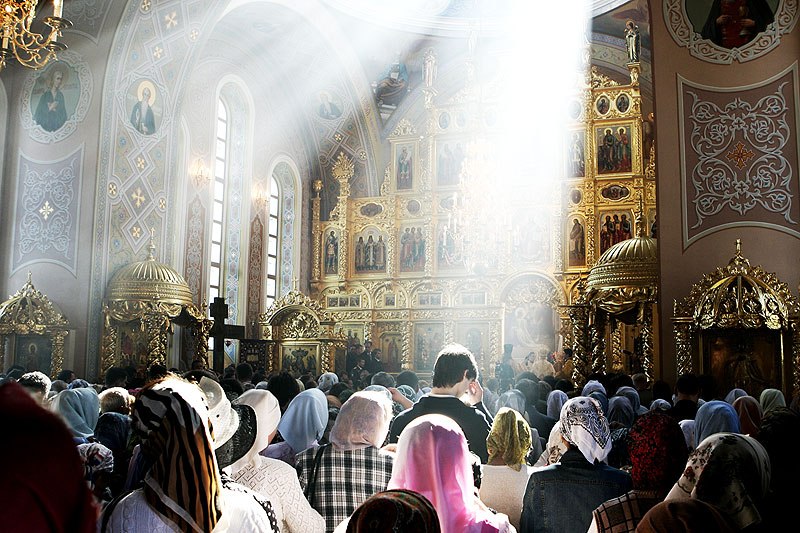 1 The Liturgy is intended to be work, something we do. If you enjoy it and learn from it and feel good and spiritually uplifted for being there, that’s very good. But that’s not the purpose of the Liturgy, any more than the purpose of cooking a meal is to make the cook feel good. So if some Sunday at Liturgy you’re in a bad mood and bored to death and wish you were just anywhere else, that’s okay, too. Get on with your work!
1 The Liturgy is intended to be work, something we do. If you enjoy it and learn from it and feel good and spiritually uplifted for being there, that’s very good. But that’s not the purpose of the Liturgy, any more than the purpose of cooking a meal is to make the cook feel good. So if some Sunday at Liturgy you’re in a bad mood and bored to death and wish you were just anywhere else, that’s okay, too. Get on with your work!
2 The Divine Liturgy belongs to the people. It is not a performance. It is not the special work of only the clergy and cantor or choir. The Divine Liturgy is something we all do together.
This was how it was in the early Church. In those days people participated. They sang. They received the Eucharist regularly, unless they were in a state of unrepentant sin. After all, the Lord Jesus had said, “Take. Eat.” He said “Drink of this, all of you.”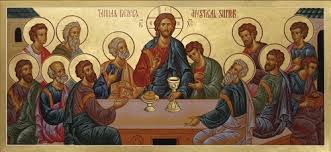 Let’s not go into the long story of how the people lost their active role in the Liturgy – but I have attended Liturgies where the choir or cantor did all the singing (not to denigrate beautiful choir music at Liturgy, but they shouldn’t just take over) and the people participated verbally not at all, didn’t even say the Creed or the Our Father, and only one or two received Communion. (Till recent times this was true of all Christians, both East and West. I remember “non-communicating” Masses in Roman Catholic and high Anglican churches where the choir did almost all the singing, and nobody received Communion except for the Priest! In most Protestant churches people sang, but the Communion service was offered infrequently – despite the intentions of the Protestant Reformers.
Let’s not go into the long story of how the people lost their active role in the Liturgy – but I have attended Liturgies where the choir or cantor did all the singing (not to denigrate beautiful choir music at Liturgy, but they shouldn’t just take over) and the people participated verbally not at all, didn’t even say the Creed or the Our Father, and only one or two received Communion. (Till recent times this was true of all Christians, both East and West. I remember “non-communicating” Masses in Roman Catholic and high Anglican churches where the choir did almost all the singing, and nobody received Communion except for the Priest! In most Protestant churches people sang, but the Communion service was offered infrequently – despite the intentions of the Protestant Reformers.
Orthodox people are slowly, slowly beginning to recover their traditional role at worship, to sing and speak again and receive the Eucharist. Even in the “old country”: Khouria Dianna and I once were at Vespers in a suburb of Athens where the people sang enthusiastically. Hooray! At Saint Nicholas, our people have participated from the beginning, and our worship has been in the language of the people, with wonderful results. I think that is how we converts have truly learned the Orthodox Faith and taken it into our hearts and minds – and not only converts but also cradle Orthodox who had never heard the Liturgy in English, and they kept saying “How beautiful! I never understood that before.”
Why is the Orthodox Liturgy “unchanging”?
Actually that’s not quite true. There has always been slow, organic change: In the music. As I said above, in the present recovery of the place of the laity in the Liturgy. We translate from one language to another, occasionally recovering words or phrases that have been lost or translated poorly. When airplanes came along, without controversy we added “and air” to our petitions for travelers.(Will we soon add “and space”?) When we get a new saint new Troparia and Kontakia, Canons and Akathists are written. The iconostasis first appeared in the early Church and over time became higher and more closed off, but now in many places is becoming lower and more open again.![]()
This is our iconostasis at Saint Nicholas, Cedarburg – the image enlarged so you can see it better. Note the intentionally open sections containing the Crosses and also surrounding the major icons. In our Antiochian tradition the Royal Doors are open during all of the Liturgy. This allows the congregation to feel more connected with the “action” in the Altar. The Mystical Supper is yet to be added.
However, none of these changes involve the texts and forms of our services. These are fixed and have been for many centuries. Furthermore, there is absolutely no movement in Orthodoxy to “improve” our Divine Liturgy, as is happening in Western Christianity.
Why not?
1 Because we believe our worship perfectly expresses and preserves our Orthodox Faith, and “what we pray is what we believe”. The two are inextricably connected. Change our worship and it would change our Faith.
For example. Western Christians have lately been altering their worship. This has usually been with the best of motives, I think because deep down they’ve come to realize that something is wrong with their understanding of the Faith, as expressed in their worship. However, their authorities have been unwilling to wait for “organic change”, so they have done this by decree from on high. 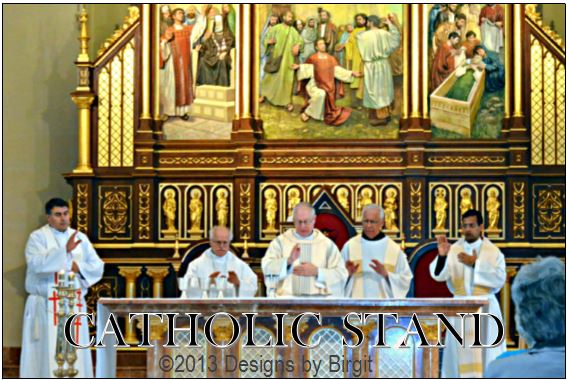 When the new Roman Catholic Mass was promulgated on Advent Sunday, 1964, I was still in seminary, so I sneaked off to see what was going on. Suddenly the Priest was facing the people and everything was in English, and nobody including the Priest and choir, knew the music. It was total chaos. In the Episcopal Church we were directed to use “trial services” of several sorts, then go back to the old services for a while, and so back and forth a few times, and then see what everybody thought of it. In both cases the result was that people were utterly confused. What people pray is indeed what they believe. So Western Christians, like their altered worship, became confused, dis-oriented about the Faith. They’ve never recovered, and so many now believe… well, God knows what.
When the new Roman Catholic Mass was promulgated on Advent Sunday, 1964, I was still in seminary, so I sneaked off to see what was going on. Suddenly the Priest was facing the people and everything was in English, and nobody including the Priest and choir, knew the music. It was total chaos. In the Episcopal Church we were directed to use “trial services” of several sorts, then go back to the old services for a while, and so back and forth a few times, and then see what everybody thought of it. In both cases the result was that people were utterly confused. What people pray is indeed what they believe. So Western Christians, like their altered worship, became confused, dis-oriented about the Faith. They’ve never recovered, and so many now believe… well, God knows what.
But Orthodox worship holds still, and so our dogmas and doctrines hold still. The result, as someone told me long ago: “Orthodox people just know who they are”, without the need for any external controls. The unchanging Divine Liturgy is part of our “control system”. That and the Holy Spirit! – above all, it is the Holy Spirit of God giving the unity Christ promised to His Holy Church.
2 Orthodox worship doesn’t change because our people don’t want it changed. Father John Meyendorff was once asked, “Why are your Orthodox services so long?” He smiled slyly and said “Because our people like it that way.” We may complain now and then about our long services – especially when it’s almost time for a ball game! And like any good family we can get into arguments about lesser matters. Orthodox are forever having jurisdictional disputes. Also today Orthodox in the West argue about which language to use in worship, but note that this change is taking place “organically” without decree from the top down. For deep down we’re a settled “put-together” Family, people who “know who we are” and want to keep our ways as they are. In a happy family, try to get your children to open Christmas presents at a different time, or if Grandma tries to change the food she “always” prepares for them, and there will be rebellion in the ranks. Just so, if anybody tried to change our Orthodox worship there would be rebellion in our ranks. It’s only in unsettled, unhappy families which have lost their identity that traditions change easily and quickly.
3 There’s another very important reason why Orthodox worship is fixed: The purpose of worship is not to entertain us with new words and ceremonies and songs. The purpose of worship is to worship! Another analogy: It might be interesting to move computer or piano keys around every so often. Put the “C” on the  top of the keyboard and the “Y” on the bottom. This image will bring shudders to my fellow typists, because it would drive us crazy! This would destroy the purpose of the keys, wouldn’t it? I’ve been typing for so many years that right now these words and even whole phrases come to mind, and without my thinking about the keys they just “arrive” on the screen. It would be the same if we reversed white and black piano keys. They should hold still so that they finally become “invisible” to the pianist, so that he or she can play beautiful music on them, almost without being aware of them.
top of the keyboard and the “Y” on the bottom. This image will bring shudders to my fellow typists, because it would drive us crazy! This would destroy the purpose of the keys, wouldn’t it? I’ve been typing for so many years that right now these words and even whole phrases come to mind, and without my thinking about the keys they just “arrive” on the screen. It would be the same if we reversed white and black piano keys. They should hold still so that they finally become “invisible” to the pianist, so that he or she can play beautiful music on them, almost without being aware of them.
Just so, liturgical forms need to hold still, so that once we learn them they can become “invisible” to us, so that without thinking about them, we can “pray through them” and reach out to our God and worship Him. That’s why when you come to an Orthodox church, you get none of this “Now turn to page 146, Hymn [whatever] in the red book”, “Now turn back to page 365 in the green pamphlet”. How could people concentrate on God, how could we worship if we were forever distracted by all that stuff? We could not.
So we have stability in Orthodox worship. At Saint Nicholas, Cedarburg, we once had some visitors from a Protestant congregation. One of them asked me, “How do you handle it when your people visit other churches and see new things and come back and want to try them here?” I answered truthfully, “The subject has never come up.”
What is the Goal of the Divine Liturgy?
The Priest’s first audible words, “Blessed is the Kingdom of the Father and of the Son and of the Holy Spirit”, give the answer. The Liturgy is the manifestation on earth of the Kingdom of Heaven. To come at it the other way, the Divine Liturgy is our 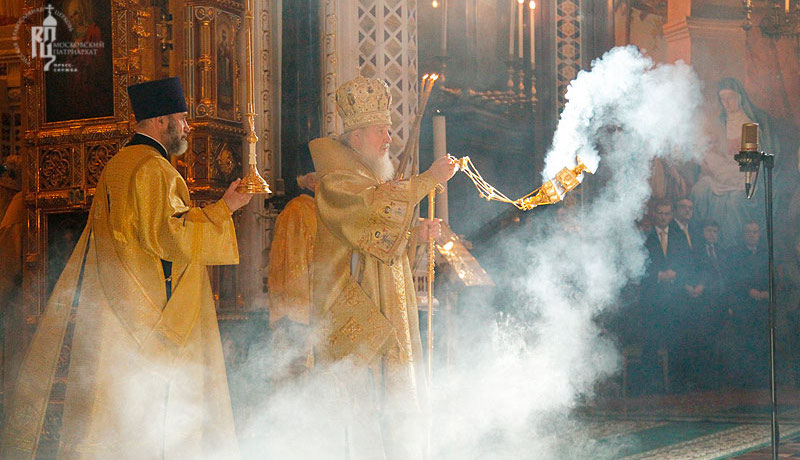 entrance, our journey into God’s eternal Kingdom, our immediate communion with the Saints and Angels who worship at His throne.
entrance, our journey into God’s eternal Kingdom, our immediate communion with the Saints and Angels who worship at His throne.
There is certainly much more going on in the Liturgy: There is education, intercessory prayer, spiritual nourishment, fellowship with each other. Our worshiping together says that there is no such thing as “me and Jesus” Christianity, as some call it. We find salvation together or not at all. Some have even seen the Liturgy as a re-enactment of the life of Christ. This is like most things: family meals, for example, feed us physically, strengthen family bonds, are used to celebrate special occasions, and even educate us as we talk with each other – but all of it is an experience of what it means to be family.
Just so, everything in the Divine Liturgy expresses and is an experience of the Reality of our Heavenly Family, the eternal Kingdom of God. To those who have eyes to see and hears to hear, the Liturgy is heaven on earth. The Liturgy is earth lifted up to heaven. Here, while we are still dwellers on earth, living in time and space, we are (as Saint John Chrysostom wrote) “endowed with the Kingdom which is to come.”
About the Forms and Texts of the Divine Liturgy:
I was tempted here to try to give you the history of how our Byzantine Liturgies became as they are. But I won’t do it. I’m no liturgical historian, and even if I had the knowledge it would be too much for the space we have here. So in what follows in this series, for the most part we’ll just look at the forms and texts as we have received them today, and give historical explanation only for parts that seem particularly confusing.
Anciently there were many local forms of the Divine Liturgy in many places. In the Fourth Century, for Byzantine use, previous Orthodox Liturgies 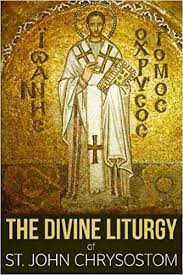 were simplified and
were simplified and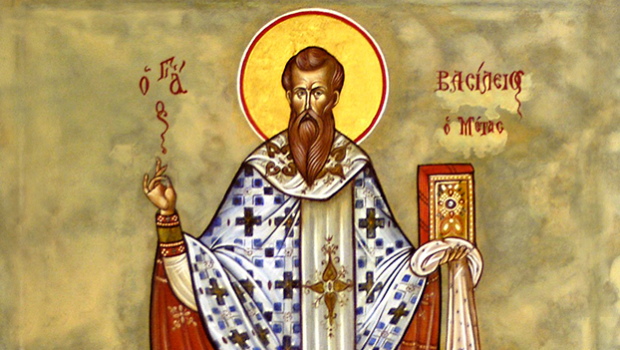 shortened (believe it or not!) into our two consistent Liturgies of Saint John Chrysostom and Saint Basil. But it was hard to remove things which the people already loved, and since then there have been more additions, some of which now seem confusing, and a few inexplicable. So why have we kept them? Well, this is the Orthodox Church where our working motto is: “C h a n g e ??!!” Someone said that our Byzantine Liturgy is the “grandma’s attic” of the Christian world! “Hang onto it. We might need it again someday.”
shortened (believe it or not!) into our two consistent Liturgies of Saint John Chrysostom and Saint Basil. But it was hard to remove things which the people already loved, and since then there have been more additions, some of which now seem confusing, and a few inexplicable. So why have we kept them? Well, this is the Orthodox Church where our working motto is: “C h a n g e ??!!” Someone said that our Byzantine Liturgy is the “grandma’s attic” of the Christian world! “Hang onto it. We might need it again someday.”
A true parable: There was a young woman who, before she roasted her Thanksgiving turkey, always cut it in half as her mother had taught her. Eventually she wondered why she was doing that and asked her mother. Her mother didn’t know: “Ask your grandmother”. So she did and her grandmother began to laugh. “Because when we were young during the Great Depression, we had a small oven, couldn’t afford a big one. So we had to cut the turkey in half to get it in!” So did they change their ways? No. They kept cutting the turkey in two because they loved their grandmother, and so they would never forget.
Next week: The Pro-Anaphora of the Divine Liturgy

What a blessing!
Thank you Father!
‘Grandma’ knows best.
You have answered sone important questions on the divine liturgy for me.
God must of seen your faithful heart and led you to Orthodoxy.
Zafeira St George Rosebay Sydney Australa